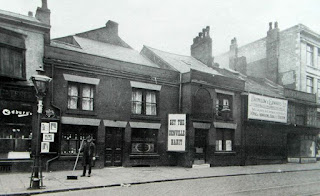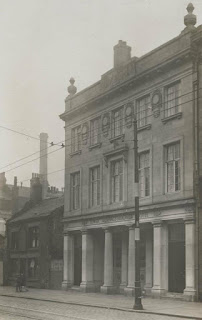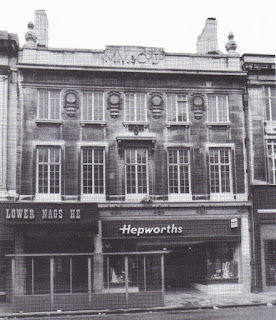Two versions of the Lower Nags Head pictured in 1927. At the top is the original eighteenth-century building. Below the grander, version, rebuilt in that year. That building still stands and is currently used as a bank .
Images from the Bolton Library And Museums
Service collection. Copyright
Bolton Council.
The Lower Nags Head stood Deansgate, close to the junction
with Bridge Street and Mealhouse Lane and a few doors along from where
Marks and Spencer’s now stands.
The area around the pub once belonged to the Brownlow family
who built Hall-I’th-Wood in the sixteenth century. Gardens and orchards
extended over what is now Market Street and Victoria Square.
The original Lower Nags Head building dated back to the
eighteenth-century. It was originally known simply as the Nag’s Head and
appears on the Great Bolton licensing records of 1778. It pre-dated as a pub its
similarly-named neighbour the Higher Nags Head by over 40 years.
By the 1840s the pub was being styled ‘the Old Nags Head’ to
differentiate it from its upstart neighbour which only became a pub in around
1820. The landlord at that time was James Isherwood and he had a sideline as a
coach proprietor. His Prince William stagecoach would head off to Manchester
from outside the pub once every day.
The local brewery of Magee, Marshall and Co eventually took
over the pub. By the twenties they also owned the Higher Nags Head and decided
to close down both pubs and rebuild the Lower Nags Head (as it had been styled since the 1860s).
The Higher Nags Head was demolished in 1929 and converted
into shops which can still be seen in between Market Street and Oxford Street.
The Lower Nags Head survived – in name only and not without radical change. The
tiny, eighteenth-century building was deemed not fit for purpose and Magee’s rebuilt
the Lower Nags a couple of doors down in 1927.
The photo at the top of the page shows the two buildings
side-by-side. The difference is remarkable; the old building looks like a shack
compared to the newer Lower Nags Head with its impressive Doric columns and its
ornate rooftop.
But while the old building had served as a pub for 150 years
the new pub, for all its fancy architecture, lasted considerably less as
licensed premises. Magee’s had sold out to Greenall Whitley in fifties and Greenall's obviously
considered the Lower Nags to have more potential as a retail outlet than as a pub.
When Magee’s rebuilt the Lower Nag's they put in a huge cellar along
with a downstairs lounge. In 1966 Greenall’s closed the two ground floor bars and
extended the downstairs lounge into part of the cellar. The Doric columns were
torn down and the street-level entrance was divided into two with stairs
leading down to a Nags Head that really was ‘lower’, but with Hepworth’s
tailors taking up the rest of the entrance and the whole of the ground floor.
But the Lower Nags Head received a new lease of life. A
resident DJ was put in and the pub is fondly remembered on various internet
forums. The 70s Bolton group on Facebook has numerous reminiscences from customers,
licensees, doormen and DJs at the Lower Nags and it is clear that a great deal
affection remains for the pub amongst its former customers.
However, it wasn’t to last. There was a refurbishment in
1982 and a name change to Oliver’s in 1985 but Greenall’s pulled the plug in
1989 and the pub closed.
The Abbey National building society converted the whole of
the ground floor into one of their branches. It is now a branch of the
Santander following their takeover of the Abbey National.
The Magee Marshall insignia can still be seen on the roof of
the former pub premises.
The Lower Nags Head
in 1980. Image from the Bolton Library And Museums
Service collection. Copyright
Bolton Council.



It was nearly opposite bridge Street not higher bridge street
ReplyDeleteHad many a good night in there 1980-83. Fondly remembered place.
ReplyDeleteOh my days, my drinking days started with that place, afternoon and disco night in mid early to mid 80s
ReplyDelete